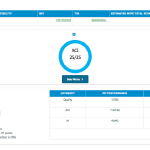With the increasing use of electronic health records and quality measure reporting requirements, data collection has become crucial for rheumatologists. But how do clinicians prevent human error and ensure data accuracy?


With the increasing use of electronic health records and quality measure reporting requirements, data collection has become crucial for rheumatologists. But how do clinicians prevent human error and ensure data accuracy?

Electronic health records, personal trackers, pedometers—all these technologies result in data, data and more data. What types of technology investments will help rheumatology practices collect and understand these data? Here are some insights into investing in technology for your practice…

Sharad Lakhanpal, MBBS, MD |
As medical professionals, we understand the impact quality research can have on how we care for our patients. The extensive adoption of electronic health records (EHRs) has enabled the collection of big data in rheumatology. This has provided a new and unique opportunity for the rheumatology community to conduct in-depth research into how patients are…

WASHINGTON, D.C.—Ongoing investigation into the disease mechanisms of inflammatory myopathies is generating needed information for the development of potential future therapeutic targets, and current data from clinical trials have shed light on myopathy concerns in different cohorts of patients. These issues were all discussed in a session titled Muscle Biology, Myositis, and Myopathies I during…

Ready for a cyber checkup? Auditing your health IT policies, safeguarding your hardware and educating your staff on the importance of data security should be routine, according to industry experts…

For keen students of American politics, the unending intrigue of the 2016 presidential race has been riveting. With an assemblage of aspiring candidates that, at its start, included a bevy of U.S. senators and former governors, a media-savvy real estate mogul, a renowned Hopkins neurosurgeon and an ophthalmologist, political junkies among us have feasted on…

Electronic health records, mobile apps, telemedicine, patient portals—new technologies offer rheumatologists more efficiency and patients greater knowledge. Here are a few ways these technologies can aid a practice…
Will Boggs, MD |
NEW YORK (Reuters Health)—Authors should agree to share deidentified patient data as a condition for publication of a clinical trial report, according to a proposal from the International Committee of Medical Journal Editors (ICMJE). “Our patients generously and selflessly volunteer to participate in clinical trials on the promise that the knowledge gained will be used…

Dr. Soumya Raychaudhuri of the Harvard Medical School, Boston, discusses how his interest in math led him to the study of bioinformatics in rheumatology. He addresses how big data can play a role in clinical rheumatology in years to come…
Lisa Rapaport |
(Reuters Health)—Drug companies are inconsistent about disclosing data related to clinical trials of new medicines, a new report says. Researchers examined publicly available data on clinical trials for 15 new medicines from 10 companies that were cleared for sale by the U.S. Food and Drug Administration in 2012. Two of the companies disclosed all trials…